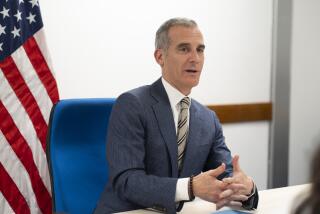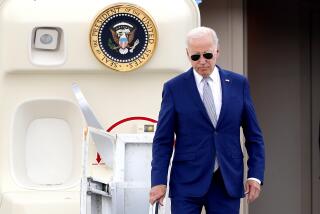A Passage to a New Era of Peace, Prosperity
- Share via
President Clinton’s visit to South Asia next week, the first by a U.S. president in 22 years, is a historic opportunity to set a new course in relations with India. But the crisis atmosphere created by events in the region over the past several months--including the Kargil conflict, the coup in Pakistan and the hijacking of an Indian Airlines plane by terrorists--could put the visit’s success at risk.
The South Asian tensions have stirred old fears. India worries that the U.S. will again treat India as an equal of the much smaller Pakistan or worse yet, forcefully intervene in their dispute over the Kashmir region. The U.S. is once again tempted to approach its relations with India solely in terms of regional security.
The threat to peace in South Asia is made more dangerous by India’s and Pakistan’s nuclear capabilities and must be on the agenda for Clinton’s private discussions with South Asian leaders.
Yet Clinton’s most important contribution to peace-making in the region will be his success in opening a new chapter in relations with India. The ability of the U.S. to encourage reconciliation between India and Pakistan depends on getting traction in the larger relationship with India while reinforcing our communications with Pakistan.
Changing realities have brought us to a turning point with India. We are no longer separated by the Cold War divide. India’s economic reforms have begun to bring the growing Indian market into the world system. An evolving congruence in U.S. and Indian security interests has been evident in high-level dialogue since the May 1998 nuclear tests. The large and influential Indian community in the United States is a vibrant new connection between the two societies.
Engaging with India holds many benefits for the United States. It will create a context of trust for dealing with India on sensitive regional and global security issues such as nonproliferation and terrorism. India will be a major factor for stability in Asia in this century. The U.S. needs the regular, high-level dialogue with Indian leaders that closer ties will bring.
India’s economy, poised for takeoff if reforms proceed, offers important opportunities to American companies and investors. They can profit not only by selling to India but also by tapping its supply of low-cost, skilled labor. In the dynamic, knowledge-based industries such as information technology and biotechnology, India and the U.S. have complementary advantages in an open world trading system. And India will be pivotal to progress on the pressing social issues--public health, human rights, poverty alleviation and the environment--central to American foreign policy in coming years. The two countries will continue to have differences on a variety of international issues. India’s new nuclear status poses difficult challenges for American policy. India will lead the developing world in resisting Western pressure to link environmental and labor standards to trade, though it is likely to be a force for moderation and compromise on these issues. India certainly will resist U.S. intervention in South Asia, which it would see as inimical to its security or national integrity.
The most contentious of the differences is Washington’s relationship with Pakistan. Indian memories of past U.S. “tilts” toward Pakistan are long. It is vital that Clinton’s visit to Pakistan be viewed as a small part of a journey primarily aimed at shaping a new relationship with India.
How can the U.S. gain Indian cooperation on the issue that matters most, preventing conflict in South Asia? Given current tensions, Clinton must argue forcefully for restraint and negotiations, and he must offer U.S. assistance in reducing tensions.
Over time, however, the answer must be a robust India-U.S. relationship, commensurate with India’s importance, that will engender mutual confidence and provide incentives for the two countries to narrow their differences and deepen their cooperation.
Clinton’s passage to India can open this new era and lay a foundation of global peace and prosperity.
More to Read
Sign up for Essential California
The most important California stories and recommendations in your inbox every morning.
You may occasionally receive promotional content from the Los Angeles Times.













